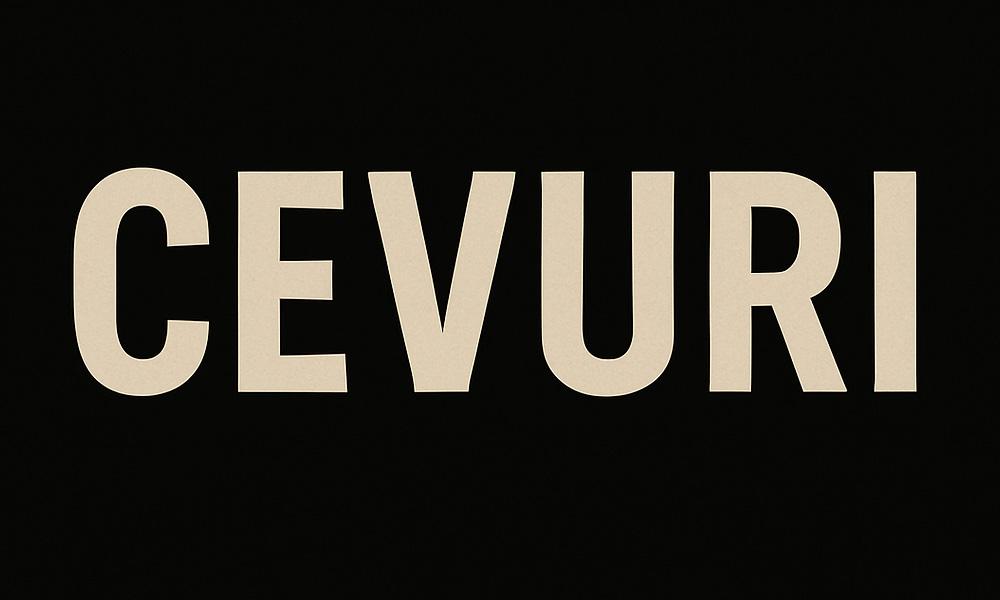Blog
The Story of Cevurı: From History to Modern Times
Published
6 months agoon
By
George
Have you ever come across a word that feels bigger than its meaning? That’s exactly what happens when you hear the word Cevurı. It’s not just a word. It’s an idea, a way of living, and even a secret to balance in life. People have used this concept for centuries, even when they didn’t call it by this name.
Cevurı is about adapting, changing, and growing while still holding on to the values that matter most. In today’s fast-moving world, this idea is more important than ever. In this article, we’ll take a simple and fun journey to explore what Cevurı really means, where it came from, and why it’s becoming so important again in 2025.
What is Cevurı?
Cevurı is a mix of tradition and transformation. It means changing with the times but not losing your roots. Think of it like a tree that grows new branches every year but still stands strong because of its deep roots. That’s what Cevurı is all about — staying flexible while holding on to what truly matters.
In simple words, Cevurı is about being smart with change. It teaches us how to move forward in life without forgetting where we came from. This is why Cevurı feels both old and new at the same time. It’s a living idea that fits perfectly in our fast and modern lives.
The Origins of Cevurı
The story of Cevurı goes back hundreds of years. It comes from ancient cultures where people lived close to nature. In those times, life was all about adapting to the seasons, the weather, and the challenges around them. Cevurı grew as a way to survive and stay strong.
In some traditions, Cevurı was seen as a sign of strength and harmony. People believed that those who followed Cevurı lived in better balance with nature and their communities. Folklore from old villages and small farming societies often spoke of Cevurı as a gift — the ability to bend without breaking, just like a strong but flexible branch.
Cevurı in Cultural Traditions
Cevurı isn’t just about survival; it’s also a part of culture and daily life. In many communities, Cevurı became a symbol of abundance and hope. For example, during harvest festivals, Cevurı was celebrated as a reminder of how people worked together and adapted to bring food to their tables.
In old stories and poems, writers often used Cevurı as a way to talk about personal growth and emotional change. They saw it as the process of breaking old patterns and building something new and better. This idea traveled across borders as people moved to new lands, carrying their traditions and the spirit of Cevurı with them.
How Cevurı Evolved Through Time
As time passed, the meaning of Cevurı changed and grew. When people moved to new countries or faced new challenges, they redefined it to match their lives. It stopped being just a cultural word and became more like a philosophy — a way of thinking that works anywhere.
Today, you can find hints of Cevurı in almost everything. Whether it’s in the way we design technology, build businesses, or even take care of our health, Cevurı’s message is the same: change is good, but only if you stay true to your core values.
Modern Meaning of Cevurı
In 2025, Cevurı means being adaptable and mindful. It’s about improving yourself and your world without losing your identity. People use this concept in different ways. Some see it as a key to personal growth. Others use it as a guide for making sustainable choices in business or the environment.
For example, tech companies use a form of Cevurı when they keep improving their products without changing their main purpose. Environmental groups also follow Cevurı by finding new ways to protect the planet while respecting traditional wisdom. It’s like a bridge between the past and the future.
Practical Uses of Cevurı Today
You might be surprised at how many areas of life are touched by Cevurı. In technology, it shows up in product updates and user-friendly designs. In schools, teachers use Cevurı when they change their lessons to match different students’ needs.
Even in health, Cevurı is there. Think about how people mix old wellness habits like herbal teas with modern fitness trends. That’s Cevurı in action. It’s all about blending the best of both worlds — tradition and modern ideas — to create something better.
Cevurı and Your Mind
Cevurı isn’t just about things or systems. It’s also about how we think. Our minds need both stability and change. We like having routines, but we also grow when we try new things. This balance is what Cevurı teaches us.
Experts say that people who follow Cevurı principles are happier and more confident. Why? Because they know how to handle change without fear. They see challenges as opportunities to grow, not as problems to run from. That’s the power of Cevurı thinking.
Health Benefits of Cevurı Practices
Cevurı is not just an idea; it can make your body and mind feel better too. When you follow its simple principles, you learn to adapt, stay flexible, and take better care of yourself. For example, many traditional Cevurı practices were linked to healthy eating habits, like choosing seasonal foods and cooking with care. This not only kept people healthier but also connected them with nature.
In modern times, this same idea works for fitness and wellness. Think about how people now change their workout routines to avoid boredom or injury. That’s Cevurı in action — small changes that keep you strong and motivated. Even mindful practices, like taking short breaks or adding variety to your meals, can bring balance and reduce stress.
The Economic Power of Cevurı
Cevurı is also a smart way to think about business and money. Companies that use Cevurı principles are often better at surviving tough times. They know when to adjust their plans, improve their products, and still hold on to what makes them unique. For example, big brands like Apple or Tesla grow by improving step by step, without losing their main identity.
Governments also use Cevurı ideas when planning for the future. Investing in renewable energy, supporting small businesses, and building flexible economies are all examples of Cevurı in action. It’s all about staying strong, even when the world changes quickly.
The Ethics Behind Cevurı
True Cevurı is not just about success; it’s also about doing the right thing. It means respecting history, culture, and people while moving forward. For example, when technology companies develop new tools, ethical Cevurı means creating safe, private, and fair systems for everyone.
In culture, ethical Cevurı means keeping traditions alive while welcoming new ideas. It’s about finding balance — not erasing the past, but building a future that respects it. If people or businesses forget this, they risk losing the real meaning of Cevurı.
Why Cevurı Matters Now
Our world is moving faster than ever. We face big challenges like climate change, new technology, and global shifts. In times like these, Cevurı feels like a guiding light. It reminds us that we can grow and adapt without losing who we are.
Think about it: life is full of surprises. But if you know how to stay flexible and strong, you can face anything. That is why Cevurı is so important in 2025. It’s not just an old idea; it’s a modern tool for living well.
How to Practice Cevurı in Daily Life
The good news is that you don’t need to do anything big or hard to bring Cevurı into your life. Start with small changes. For example, switch up your daily routine to keep things fresh. Try new meals or add a new hobby to your week. This helps your mind and body stay active.
At work, you can use Cevurı by asking for feedback and improving step by step instead of rushing for perfection. In your community, you can support projects that mix tradition with modern ideas, like local markets or eco-friendly events. Even recycling or reusing items at home is a form of Cevurı because it combines smart thinking with care for the future.
The Future of Cevurı
The future of Cevurı looks bright. Experts believe that this concept will play a big role in technology, health, and even the way we design cities. Imagine AI systems built with Cevurı ideas — flexible, safe, and helpful. Or picture modern cities that use smart technology while still keeping their cultural charm.
As we move ahead, more industries will follow Cevurı-inspired methods. From renewable energy to cultural tourism, the focus will be on adapting without losing meaning. This shows that Cevurı is not just an old story but a path to a better, balanced future.
Bottom-Line
Cevurı is more than a word from the past. It is a way of living, a mindset, and a reminder that balance is possible. From ancient traditions to modern businesses, Cevurı teaches us how to stay strong while moving forward.
In 2025, its message is clear: adapt with purpose, change with care, and respect the roots that make you who you are. If you start seeing life through the lens of Cevurı, you’ll notice that every challenge is also a chance to grow.
(FAQs)
What does Cevurı mean, and where does it come from?
Cevurı comes from old cultures and means adapting, growing, and improving while holding on to your core values. It started as a symbol of resilience and balance with nature.
Why is Cevurı important today?
In a fast-changing world, Cevurı helps us stay flexible and smart. It teaches both people and businesses how to grow without losing their identity.
How can I bring Cevurı into my daily life?
You can start small — add variety to your routine, try new meals, or improve your work step by step. It’s all about adapting in simple but meaningful ways.
Does Cevurı improve health?
Yes, it does. By following Cevurı-inspired habits like diverse diets and varied fitness routines, you can stay healthier and reduce stress.
How does Cevurı balance tradition and modernization?
Cevurı allows us to keep our traditions while welcoming new ideas. For example, local crafts can use modern tools but still preserve their original beauty and meaning.
You Might Also Like: UBG67

Tips and Tricks for First-Date Men’s Fashion in 2026

Call My Doctor Health Care LLC Sets a New Standard for Home Healthcare in Dubai

StableProxy Review: What Is It and Why You Might Need It in 2026

Recording Apps: Best Picks for Audio Capture in Screen Recording (2026 Guide)

7 Curb Appeal Improvements Your Home Might Be Crying Out For

Why Ahmedabad is a Must Visit City in India?

Trend vs Investment: Which Watch Features Stay Stylish for Years (Crystal, Case, Dial, Bracelet)

Corporate Reputation Management and the Cost of AI-Generated Errors

Hidden Costs of Economy Umrah Packages: A Breakdown of Extra Fees

RF PCB Solutions: How FastTurn PCB Powers High-Frequency Electronics with Precision

Who Is Marlene Knaus? The Untold Story of Niki Lauda’s First Wife

Jacqueline Bernice Mitchell: The Inspiring Story of Jerry Rice’s Ex-Wife

Curious About JOI Database? Read This First Before You Click Anything

Mickey Middleton: The Untold Story of Bryan Cranston’s First Wife

Where Is Barbara Boothe Now? Inside Her Life After Larry Ellison

Wendy Lang: Meet the Therapist Married to Cenk Uygur

Alisande Ullman Today: What Happened After Her Divorce from Leslie Nielsen?

Where Is Noelle Watters Now? Jesse Watters’ Ex-Wife’s Life After Divorce

Should You Use Wooflix in 2025? Honest Review and Best Alternatives

Where Is Tanya Hijazi Now?: All About Rick James’ Former Wife

Tips and Tricks for First-Date Men’s Fashion in 2026

Call My Doctor Health Care LLC Sets a New Standard for Home Healthcare in Dubai

StableProxy Review: What Is It and Why You Might Need It in 2026

Recording Apps: Best Picks for Audio Capture in Screen Recording (2026 Guide)

7 Curb Appeal Improvements Your Home Might Be Crying Out For

Why Ahmedabad is a Must Visit City in India?

Trend vs Investment: Which Watch Features Stay Stylish for Years (Crystal, Case, Dial, Bracelet)

Corporate Reputation Management and the Cost of AI-Generated Errors

Hidden Costs of Economy Umrah Packages: A Breakdown of Extra Fees

RF PCB Solutions: How FastTurn PCB Powers High-Frequency Electronics with Precision
Categories
Trending
-

 Celebrity8 months ago
Celebrity8 months agoWho Is Marlene Knaus? The Untold Story of Niki Lauda’s First Wife
-

 Celebrity5 months ago
Celebrity5 months agoJacqueline Bernice Mitchell: The Inspiring Story of Jerry Rice’s Ex-Wife
-

 Entertainment6 months ago
Entertainment6 months agoCurious About JOI Database? Read This First Before You Click Anything
-

 Celebrity6 months ago
Celebrity6 months agoMickey Middleton: The Untold Story of Bryan Cranston’s First Wife
